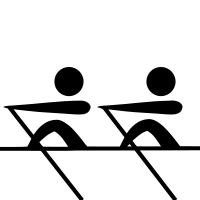Rowing at the 1900 Summer Olympics – Men's coxed four
The coxed fours was one of the competitions in the Rowing at the 1900 Summer Olympics events in Paris. The competition was plagued by controversy involving which boats should advance to the final. In one of the most unusual decisions in Olympic history, two separate finals were held for the event, each of which are still considered Olympic championships by the International Olympic Committee. The crew of all six boats to compete in the two finals are Olympic medallists.
| Men's coxed fours at the Games of the II Olympiad | |||||||||||||||||||
|---|---|---|---|---|---|---|---|---|---|---|---|---|---|---|---|---|---|---|---|
| Venue | River Seine | ||||||||||||||||||
| Dates | 25–26 August | ||||||||||||||||||
| Competitors | 50 from 4 nations | ||||||||||||||||||
| Medalists | |||||||||||||||||||
| |||||||||||||||||||
| Rowing at the 1900 Summer Olympics | |
|---|---|
 | |
| Single sculls | men |
| Coxed pair | men |
| Coxed four | men |
| Eight | men |
The coxed fours event was held from 25 to 26 August 1900. Ten boats, involving fifty rowers from four nations, competed.[1]
Results
Semifinals
Initially, the top boat in each semifinal plus the runner-up in the third semifinal (which had four boats instead of the three boats competing in each of the other two), were to advance. Following protests which ensued after the runner-up in the second semifinal and the third-place boat in the third semifinal each posted better times than the winner of the first, the qualification rules for the final were altered. Eventually, the six boats were broken into two groups and competed in separate finals. The runners-up in semifinals 2 and 3 as well as the third-place boat in semifinal 3 competed in the first final, while the three semifinal winners competed in the second.
Semifinal 1
| Place | Boat | Rowers | Nation | Time |
|---|---|---|---|---|
| 1 | Ludwigshafener Ruderverein | Ernst Felle Otto Fickeisen Carl Lehle Hermann Wilker Franz Kröwerath (cox) | 6:14.0 | |
| 2 | Réal Club Barcelona | Juan Camps José Fórmica Ricardo Margarit Orestes Quintana Antonio Vela (cox) | 6:38.4 | |
| 3 | Club Nautique de France | René Beslaud Léon Deslinières Peyronnie Saurel Unknown cox | 6:40.0 |
Semifinal 2
| Place | Boat | Rowers | Nation | Time |
|---|---|---|---|---|
| 1 | Minerva Amsterdam | Coenraad Hiebendaal Geert Lotsij Paul Lotsij Johannes Terwogt Hermanus Brockmann (cox) | 6:02.0 | |
| 2 | Club Nautique de Lyon | Georges Lumpp Charles Perrin Daniel Soubeyran Émile Wegelin Unknown cox | 6:06.2 | |
| — | Société Nautique de la Marne | Paul Cocuet Jules Demaré Clément Dorlia René Waleff Unknown cox | Did not finish |
Semifinal 3
| Place | Boat | Rowers | Nation | Time |
|---|---|---|---|---|
| 1 | Germania Ruder Club, Hamburg | Gustav Goßler Oskar Goßler Walter Katzenstein Waldemar Tietgens Carl Goßler (cox) | 5:56.2 | |
| 2 | Cercle de l'Aviron Roubaix | Henri Bouckaert Jean Cau Émile Delchambre Henri Hazebrouck Charlot (cox) | 5:59.0 | |
| 3 | Favorite Hammonia | Wilhelm Carstens Julius Körner Adolf Möller Hugo Rüster Gustav Moths (cox)[2] | 6:03.0 | |
| 4 | Club Nautique de Dieppe | Angot Henri Delabarre Robert Gelée Maison Unknown cox | 6:20.0 |
Finals
Final A
| Place | Boat | Rowers | Nation | Time |
|---|---|---|---|---|
| 1 | Cercle de l'Aviron Roubaix | Henri Bouckaert Jean Cau Émile Delchambre Henri Hazebrouck Charlot (cox) | 7:11.0 | |
| 2 | Club Nautique de Lyon | Georges Lumpp Charles Perrin Daniel Soubeyran Émile Wegelin Unknown cox | 7:18.0 | |
| 3 | Favorite Hammonia | Wilhelm Carstens Julius Körner Adolf Möller Hugo Rüster Max Ammermann (cox)[2] | 7:18.2 |
Final B
| Place | Boat | Rowers | Nation | Time |
|---|---|---|---|---|
| 1 | Germania Ruder Club, Hamburg | Gustav Goßler Oskar Goßler Walter Katzenstein Waldemar Tietgens Carl Goßler (cox) | 5:59.0 | |
| 2 | Minerva Amsterdam | Coenraad Hiebendaal Geert Lotsij Paul Lotsij Johannes Terwogt Hermanus Brockmann (cox) | 6:03.0 | |
| 3 | Ludwigshafener Ruderverein | Ernst Felle Otto Fickeisen Carl Lehle Hermann Wilker Franz Kröwerath (cox) | 6:05.0 |
References
- "Rowing at the 1900 Paris Summer Games: Men's Coxed Fours". Sports Reference. Archived from the original on 18 April 2020. Retrieved 22 July 2018.
- The German team changed the coxswain after the semi-final. Gustav Moths participated only in the semi-final and Max Ammermann participated in the final. However, the IOC medal database credits the bronze medal only to Gustav Moths.
External links
- International Olympic Committee medal winners database
- De Wael, Herman. Herman's Full Olympians: "Rowing 1900". Accessed 26 February 2006. Available electronically at .
- Mallon, Bill (1998). The 1900 Olympic Games, Results for All Competitors in All Events, with Commentary. Jefferson, North Carolina: McFarland & Company, Inc., Publishers. ISBN 0-7864-0378-0.